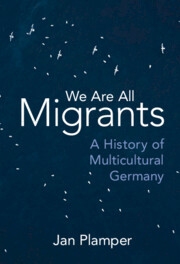Introduction
Published online by Cambridge University Press: 16 March 2023
Summary
The introduction lays out the book’s conceptual framework. The point of departure is a performative concept of identity as lived and forever changing, so that multiple identities, including immigrant cultural identities, can coexist with German citizenship. After emphasizing that everyone’s ancestors crossed borders at some point, that we are all migrants, it proposes the term PlusGermans for more recent arrivals. It next sketches a concept of a collective national identity, a “New We.” The New We has two meanings: first, it designates all citizens without exception (there is no questioning of the Germanness of such “visible minorities” as Afro-Germans). Second, it proffers a symbolic celebration of this collective identity, the contents of which shall be determined – within the boundaries of the constitution, so that no one’s basic rights are violated – democratically. For instance, what should naturalization ceremonies look like? It ponders whether Germany is already postnational, but concludes that it is not on multiple levels, and that for progressives to avoid definining the civic nation, lest such defining end up in Nazism, leaves the field open to right-wing populists.
Keywords
- Type
- Chapter
- Information
- We Are All MigrantsA History of Multicultural Germany, pp. 1 - 9Publisher: Cambridge University PressPrint publication year: 2023



